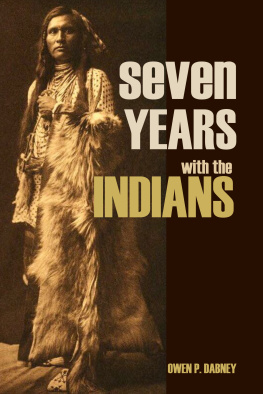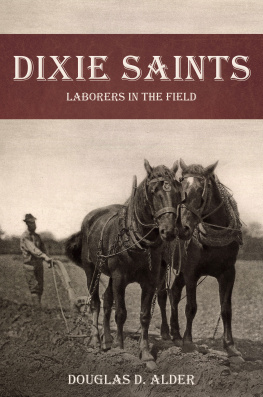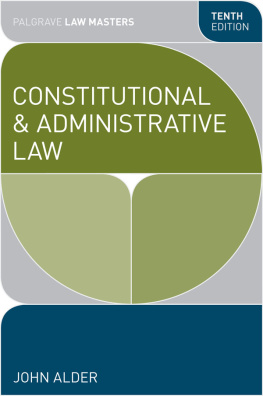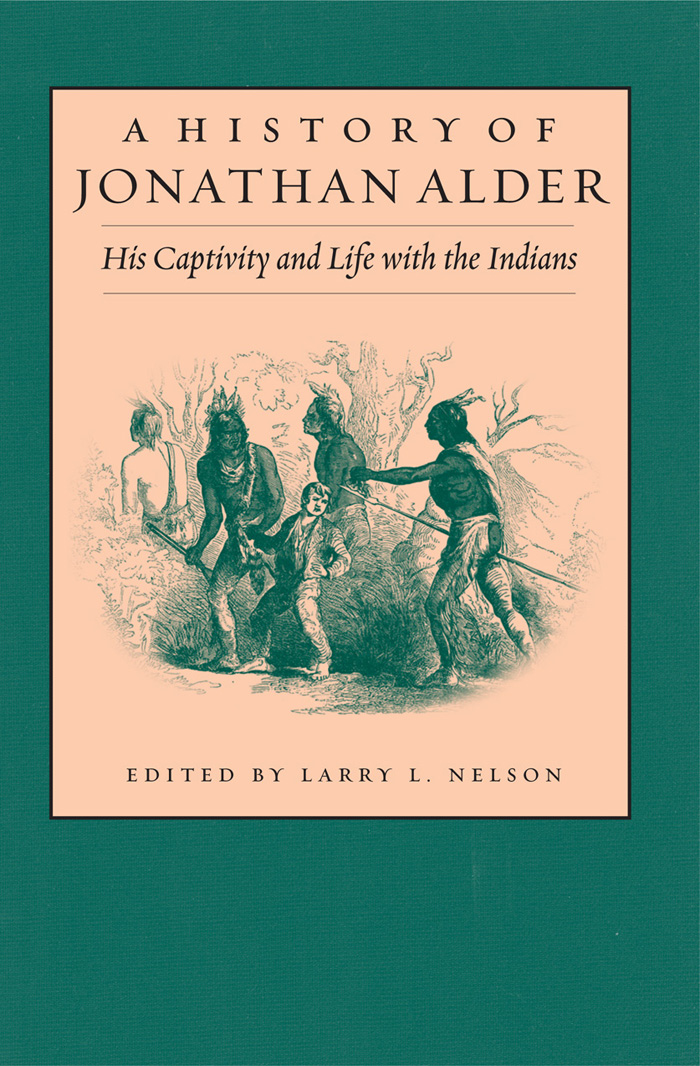A HISTORY
 of
of 
JONATHAN
ALDER
His Captivity and Life
with the Indians
BY HENRY CLAY ALDER
Transcribed and with a foreword by Doyle H. Davison
Compiled, annotated, edited, and with an
introduction by Larry L. Nelson

THE UNIVERSITY OF AKRON PRESS
Copyright 2002 by Larry L. Nelson
All rights reserved
All inquiries and permissions requests should be addressed to the publisher,
The University of Akron Press, Akron, OH 44325-1703
Manufactured in the United States of America
First edition 2002
13 12 11 10 5 4 3
Library of Congress has cataloged the hardcover edition of this book as follows.
Alder, Henry Clay, 19th cent.
A history of Jonathan Alder : his captivity and life with the Indians /
by Henry Clay Alder ; transcribed and with a foreword by Doyle H.
Davison ; compiled, annotated, edited, and with an introduction by
Larry L. Nelson. 1st ed.
p. cm. (Series on Ohio history and culture)
The version within these pages is the Doyle Davison transcript
of the Henry Clay manuscript held by the Ohio Historical
Society...Introd.
Includes bibliographical references (p.) and index.
ISBN 1-884836-80-1 (hardcover : alk. paper)
1. Alder, Jonathan, b. 1773. 2. Indian captivitiesOhio.
3. Shawnee IndiansSocial life and customs.
4. Mingo IndiansSocial life and customs.
5. Frontier and pioneer lifeOhio.
I. Davison, Doyle H.
II. Nelson, Larry L. (Larry Lee), 1950
III. Title. IV. Series.
E 99. S 35 A 45 2002
974.004'973dc21
2001006416
ISBN 978-1-884836-98-5 (pbk.: alk. paper)
ePDF 978-1-935603-10-8 ePUB 978-1-935603-11-5
Manufactured in the United States of America
The paper used in this publication meets the minimum requirements of
American National Standard for Information SciencesPermanence of
Paper for Printed Library Materials, ANSI Z 39.481984.
Contents

A HISTORY OF
JONATHAN ALDER:
HIS CAPTIVITY AND
LIFE WITH THE
INDIANS
Foreword

Out of the dim past comes the romantic story of Jonathan Alder, so engrossing, so improbable as viewed from our twentieth-century standpoint, that we may be prone to feel that the narrator has drawn upon his imagination in dealing with the life of this remarkable man, or that possibly, he has selected him as a romantic figure around which to build a colorful story of the pioneer days of Madison County. But in refutation of any such theory, and disclaiming any desire to add unearned luster to the memory of Jonathan Alder, the writer points to the old round log cabin on Big Darby in which he dwelt with his Indian wife, and the hewed log cabin adjoining it to which he took a charming bride in the person of Mary Blont, still standing at this late date, one hundred and twenty-four years afterwards, as mute evidence of the truth. Add to these the old moss-covered slab in the Foster Cemetery lying broken on the ground, having been replaced in the year 1916 by a fine granite stone with suitable inscription by the children of Henry Clay Alder as a tribute to their father.
In 1927, the old log cabin was torn down and moved to the Alder Chapel Churchyard by all the great-grandchildren of Jonathan Alder, as it was his wish that the old cabin be preserved, and here it is hoped it will stand for another one hundred years.
In 1928, a flagpole and flag was placed by the cabin, the gift of a great-grandson, James W. Alder of Chicago.
In 1922, a chapter was formed by the women of Madison County and named the Jonathan Alder Chapter, Daughters of 1812, which has met once a month ever since. Each year on September 17th, his birthday, this chapter, with relatives and friends from the surrounding country, meet at his last resting place and cover his grave with a blanket of flowers.
In addition to these visible relics of the past, there is Jonathan Alders own story of his life as told to his son Henry nearly one hundred years ago, and written down by the latter. This story, which covered over one hundred pages of manuscript, was loaned to Henry Howe in the preparation of Howes Historical Sketches, but it afterwards was lost for a long time. Howe did not print it in its entirety but took only the main facts and, therefore, much was lost.
The following manuscript, a copy of which is the one that was lost for more than eighty years, was accidentally found by a grandson, Henry Betts, with the aid of Henry Alder, a great-grandsonso we herewith present it to you.
Doyle H. Davison
(1935)
Acknowledgments

Many people assisted me as I prepared Alders narrative, and it gives me great pleasure to acknowledge their hard work on my behalf. Louise Jones, Durea Kemp, and Tom Starbuck at the Ohio Historical Societys Library/Archives Division responded promptly to numerous requests for reference materials and administrative help as I prepared the manuscript for publication. Amy Johnson assisted with the manuscripts early copyediting. Randy Buchman of Defiance College, Mike Pratt at Heidelberg College, Chris Duckworth at Timeline Magazine, Don Rettig at Toledo Metro Parks, and Adam Sakel, my colleague at Fort Meigs State Memorial, all read and commented on early drafts of the book. Will Currie and his staff at the Firelands College library were very responsive to my requests for interlibrary loan materials, as were the OhioLINK staff at Bowling Green State Universitys Jerome Library. Al Gutchess gave me the opportunity to refine my thinking about Alder by allowing me to discuss my work at his annual Eastern Woodland Indian conference. Gretchen Green, the director of the Madison County (Ohio) Historical Society, Catherine Alder of Fort Worth Texas, Bill and Rita Alder of Newport, Oregon, and Dorothy Walley of Waterville, Ohio, assisted me with Alders genealogy and in tracking down the still elusive Henry Clay Alder manuscript. To all of them go my sincerest thanks.
Larry L. Nelson
Introduction

On a brilliant spring morning in May 1782, nine-year-old Jonathan Alder and his older brother David set out to find a mare that had wandered from their isolated cabin in southwest Virginia and into the rugged mountains and dense forests of the surrounding countryside. Later in the day, the boys found their horse, but as they struggled to lead the reluctant animal home, they were attacked by a party of Indians from Ohio. David was killed and Jonathan taken prisoner. His captors brought Alder back to Ohio, where he was adopted by a Mingo warrior and his Shawnee wife. Here he spent the next thirteen years. During that time, Alder lived fully as an Indian. He learned their language and observed their customs. He hunted, traded, and fought at their side. In 1795, after the death of his adoptive parents, Alder left the Indians and eventually settled in Pleasant Valley, near present-day Plain City in central Ohio. At the urging of an acquaintance, he traveled to Virginia in 1805, where he had the extraordinary good fortune to find his mother and remaining siblings still living in the neighborhood where he had been captured as a youth. After his reunion, he married a woman from Virginia, returned to Pleasant Valley, and became something of a local celebrity as a result of his childhood adventures. In the late 1830s or early 1840s, probably at the insistence of his family and friends, Alder composed his memoirs, in which he recounted his life with the Ohio Indians and his experiences as one of the areas earliest pioneers.










 of
of 